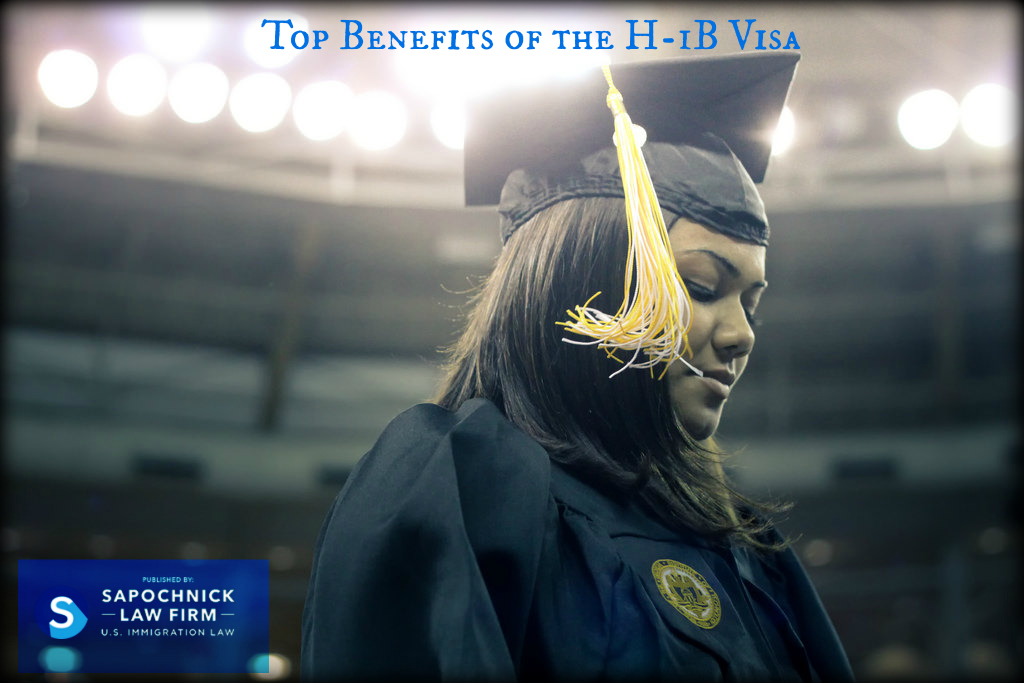The H-1B visa is one of the most coveted visas in the United States for several reasons. One of the biggest perks of the H-1B visa is that it is granted for a period of three years, and can be extended for an additional three years. Recipients of the H-1B visa can also bring their dependents to live with them in the United States on an H-4 visa. The H-1B visa is also a popular option because it gives workers the flexibility of accepting and entering new employment, made possible by the portability provision of the H-1B program (8 U.S.C. § 1184(n)). The portability provision allows an H-1B worker to change jobs without having to risk falling “out of status.” Recently, USCIS also improved its portability provision with the passage of a new law that will give H-1B workers who have been laid off a 60-day grace period to transfer to a new employer. But perhaps the greatest upside to the H-1B visa however, is that it is one of the few visas that allows a nonimmigrant to apply for permanent residency as a beneficiary of an immigrant visa petition, without the immigrant petition having any negative affect on their H-1B status. This privilege is recognized in the law and is known as “dual intent.” Foreign nationals holding a “dual intent” visa such as an H-1B visa are allowed to file a green card petition, while continuing employment under the terms of their visa, and may also travel on their visa without seeking permission from USCIS.
In this sense, the H-1B visa is one of the few visas that opens a direct path to permanent residency. Other popular employment visas such as the E-2 treaty investor visa do not create a direct path to permanent residency and are not considered “dual intent” visas.
Understanding the Importance of “Dual Intent”
Whenever a foreign national applies for a nonimmigrant visa type at a United States consulate or embassy abroad, the immigration officer will carefully consider the applicant’s “intent” in coming to the United States at the time of the visa interview. Typically, when an individual applies for a non-immigrant visa type, the presumption is that the individual is coming to the United States temporarily, and will not seek immigration benefits once they have entered the United States. Applying for a non-immigrant visa type with the intent to immigrate, or remain in the United States indefinitely, is a serious violation of the immigration laws of the United States, and can lead to serious consequences, such as a temporary or permanent bar of admission to the United States. To discover the applicant’s intentions, immigration officers are trained to ask foreign nationals very specific questions to determine whether the foreign national intends to immigrate to the United States. In addition to asking questions, immigration officers look for specific documentation to establish whether the applicant has strong ties to their home country. If the applicant meets all the eligibility requirements for the visa they are applying for, and if after reviewing the applicant’s documentation, the immigration officer is convinced that the foreign national does not seek to immigrate to the United States, the immigration officer will most likely grant the visa that is applied for. Foreign nationals who have a pending green card application cannot seek a temporary non-immigrant visa to travel to the United States, unless they are applying for a “dual intent” visa such as the H-1B visa.
A Path to Permanent Residency
“Dual intent” is thus a powerful tool for H-1B visa holders because an H-1B worker’s “intent” to immigrate to the United States is not questioned. The H-1B visa category allows the foreign national to have a temporary visa, and at the same time have the intent to immigrate to the United States. In other words, foreign nationals can apply for the H-1B visa even if they have the intent to immigrate to the United States. “Dual intent” means that an H-1B holder may have “dual” purposes for entering the United States. H-1B visa holders who apply for a green card will not need to worry about running into any problems regarding their “intentions” of immigrating to the United States. Normally professionals who are admitted to the United States on a non-immigrant visa type that does not recognize “dual intent,” and later apply for a green card based on employment, will confront issues regarding their “intent.” The H-1B visa is one of the exceptions. If you would like to discuss whether you are eligible for the H-1B visa please contact our office for a free first time consultation.
For more helpful information about the H-1B visa please visit our website.

